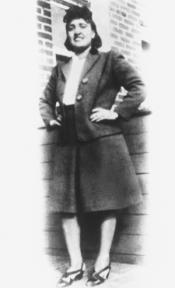Wealthy funder pays reparations for use of HeLa cells
By Alexandra Witze,
Nature
| 10. 29. 2020
Howard Hughes Medical Institute’s six-figure donation is a step towards addressing racial injustice in the sciences.
A major biomedical-research organization has for the first time aimed to make financial reparation for the continuing experimental use of cells from Henrietta Lacks, a Black woman who was the source of the historic ‘HeLa’ cell line, which has been a mainstay of biological research for decades. The Henrietta Lacks Foundation announced the six-figure gift from the Howard Hughes Medical Institute (HHMI) in Chevy Chase, Maryland, on 29 October.
In 1951, doctors took cancerous cells from Lacks without her consent, and later created the HeLa cell line, which today supports a multibillion-dollar biotechnology industry. Lacks died soon after, and for decades, her family saw no financial compensation and were not consulted on other medical decisions stemming from the use of the cells in research.
“We felt it was right to acknowledge Henrietta for the use of HeLa cells and to acknowledge that the cells were gained inappropriately,” says Erin O’Shea, president of the HHMI. “And to acknowledge that we have a long way to go before science and medicine are really equitable.” The HHMI did not disclose the exact amount...
Related Articles
By Julia Métraux, Mother Jones | 02.10.2026
Why was Jeffrey Epstein obsessed with genes? In the latest tranche of Epstein records and emails made available by the Department of Justice, themes of genes, genetics, and IQ—alongside more explicit threads of white supremacy—keep cropping up, often adjacent to Epstein’s...
By Ava Kofman, The New Yorker | 02.09.2026
1. The Surrogates
In the delicate jargon of the fertility industry, a woman who carries a child for someone else is said to be going on a “journey.” Kayla Elliott began hers in February, 2024, not long after she posted...
By Dan Barry and Sonia A. Rao, The New York Times | 01.26.2026
Photo by Gage Skidmore from Peoria, AZ, United States
of America, CC BY-SA 2.0, via Wikimedia Commons
Late last month, a woman posted a photograph on social media of a purple hat she had knitted, while a black-and-white dog...
By Shobita Parthasarathya, Science | 01.22.2026
These are extraordinarily challenging times for university researchers across the United States. After decades of government largess based on the idea that a large and well-financed research ecosystem will produce social and economic progress, there have been huge cuts in...




